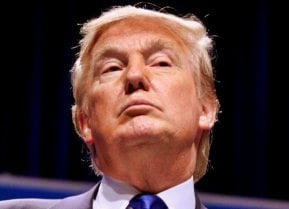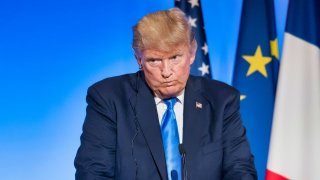The Democrats Legal War Against Donald Trump Only Hurts America
The Donald Trump case has raised concerns about the impartiality of the American justice system, likening it to those in third-world countries.
Summary: The conviction of Donald Trump in New York on 34 misdemeanors, elevated to felonies, has sparked significant controversy.
-Critics argue that the trial was marred by legal irregularities, a biased judge, and political motivations, comparing it to Soviet show trials.
-The case involved allegations of paperwork errors related to campaign finance, yet the indictment did not specify the exact laws violated.
-The jury's quick verdict and the judge's refusal to allow expert testimony on federal campaign finance law have further fueled claims of injustice.
-This case has raised concerns about the impartiality of the American justice system, likening it to those in third-world countries.
Outrage Over Donald Trump's Conviction: A Flawed Trial?
It’s hard to adequately describe what happened to Donald Trump in Venezuela-on-the-Hudson. Outrageous? A travesty of justice? A devasting blow to the sanctity of our justice system and its reputation for fairness and nonpartisanship? An American repetition of the Soviet show trials of the 1930s?
It’s all of those things. And you don’t have to be a Trump supporter to understand that.
A former president was convicted of 34 misdemeanors for paperwork errors (whose statute of limitations had run out) that were changed to felonies because he had supposedly violated another state law – nowhere mentioned in the indictment – that makes it a crime to use “unlawful” means to promote or oppose the election of a candidate.
And what was that “unlawful” means? Well, the defendant didn’t know because those other “unlawful” means (i.e., other crimes) weren’t mentioned in the indictment either. The judge told the jurors that they didn’t need to even agree on what other crimes the defendant had committed, seemingly in conflict with hundreds of years of English and American jurisprudence, including the Constitution’s guarantee of due process of law.
No, said the judge, the jury could consider violations of tax law or a violation of federal campaign finance law or of some other unnamed law for listing as a legal expense – instead of as a campaign expense – a settlement payment made to an individual who was represented by counsel in a perfectly legitimate, and perfectly legal, transaction. But no need for a unanimous decision on that issue.
A violation of federal campaign finance law? What were a local prosecutor and a state court judge doing bringing up a violation of federal law over which they have no jurisdiction whatsoever? And if that was something the members of the jury—who know nothing about federal campaign finance law—could consider, why did the judge tell the defendant he would not allow Brad Smith, a former Federal Election Commissioner and one of the nation’s leading experts on federal campaign finance law, to explain to the jury what is considered – and what is not considered – a campaign-related expense under federal law?
The judge acted as if he was a member of the prosecution team throughout this case, a case so lacking in merit that the prior district attorney—the one who preceded the Soros-supported rogue prosecutor Alvin Bragg—refused to file it. Judge Juan Merchan consistently ruled against Trump and allowed the prosecution to essentially do whatever it wanted, including admitting evidence and allowing testimony to matters that were completely irrelevant to the actual charges and whose only purpose was to confuse the jury and blacken the character of the defendant.
Judge Merchan committed the same sorts of error that recently prompted the New York Court of Appeals in People v Weinstein to throw out Harvey Weinstein’s rape conviction. How so? Because the trial judge in that case abused his discretion by admitting irrelevant testimony and evidence that was comprised of, as the appeals court said, “untested allegations of nothing more than bad behavior that destroys a defendant’s character but sheds no light on their credibility as related to the criminal charges lodged against them.”
Moreover, Judge Merchan should never have presided over this case in the first place, just like this prosecution should never have been brought in the first place. Merchan should have recused himself from handling it from the very beginning. In addition to the fact that he donated money to the Biden campaign as well as to a group called “Stop Republicans,” his daughter is a Democratic political consultant who worked for the Biden-Harris campaign and whose clients have been raising money off of this kangaroo court trial.
After a six-week trial, the jury took less than two days to find Trump guilty of 34 felony charges. This hardly seems like enough time to take a hard, objective look at the lack of evidence produced by the prosecution that an actual crime had been committed. This suggests that political bias and animus towards the defendant for reasons unconnected to the case may have been a decisive, if not the decisive, factor during their hasty deliberations.
This is especially so since the only people who could provide any insight into what Trump did and what he knew with respect to the alleged offenses were Allen Weisselberg—the Trump Organization’s CFO whom the prosecution did not call as a witness—and Michael Cohen—who lied under oath on innumerable prior occasions, admitted that he hates Donald Trump, blames Trump for everything that has gone wrong in his life, stole from Trump, recorded their conversations in violation of the attorney-client privilege, and said he would profit handsomely if Trump is convicted.
When the defense teams files its appeals brief, it will probably have to be the size of the novel, “War and Peace,” to list all of the legal errors and fallacies committed by the judge and the prosecution. The Appeals Court of New York should follow the example of the U.S. Supreme Court. When Trump’s lawyers filed an appeal with that court over Colorado’s unconstitutional action in disqualifying Trump from the ballot, the court acted with unprecedented speed to put the matter on an expedited schedule in order to get a decision out as soon as possible.
The New York courts have a duty and responsibility to do the same thing. I don’t have a lot of faith in those courts, many of whose judges, as we have seen in this case and the meritless civil case brought by New York Attorney General Letitia James, seem infected with partisan politics influencing what they do.
One final point about all of this. One of my colleagues just got back from an international conference that had representatives from all over the world, including many third-world countries. Their reaction to these prosecutions of the former president was that the United States has finally joined the ranks of their home countries where their governments use the judicial system to go after their political opponents.
It is a said day for America and a justice system that was, until now, much admired and copied around the world.
About the Author:
Hans von Spakovsky is a Senior Legal Fellow at the Heritage Foundation and a former Commissioner on the Federal Election Commission and lawyer at the U.S. Justice Department.
Image Credit: Shutterstock.


